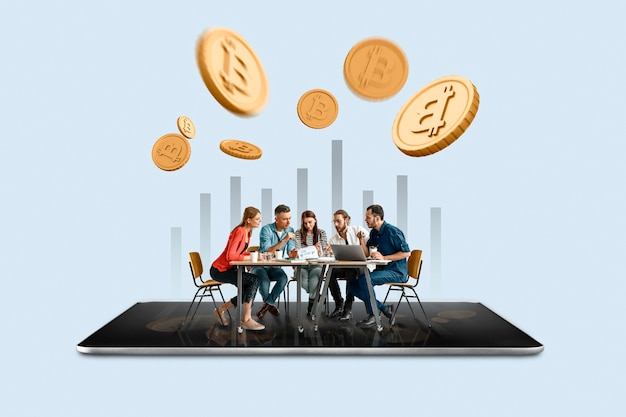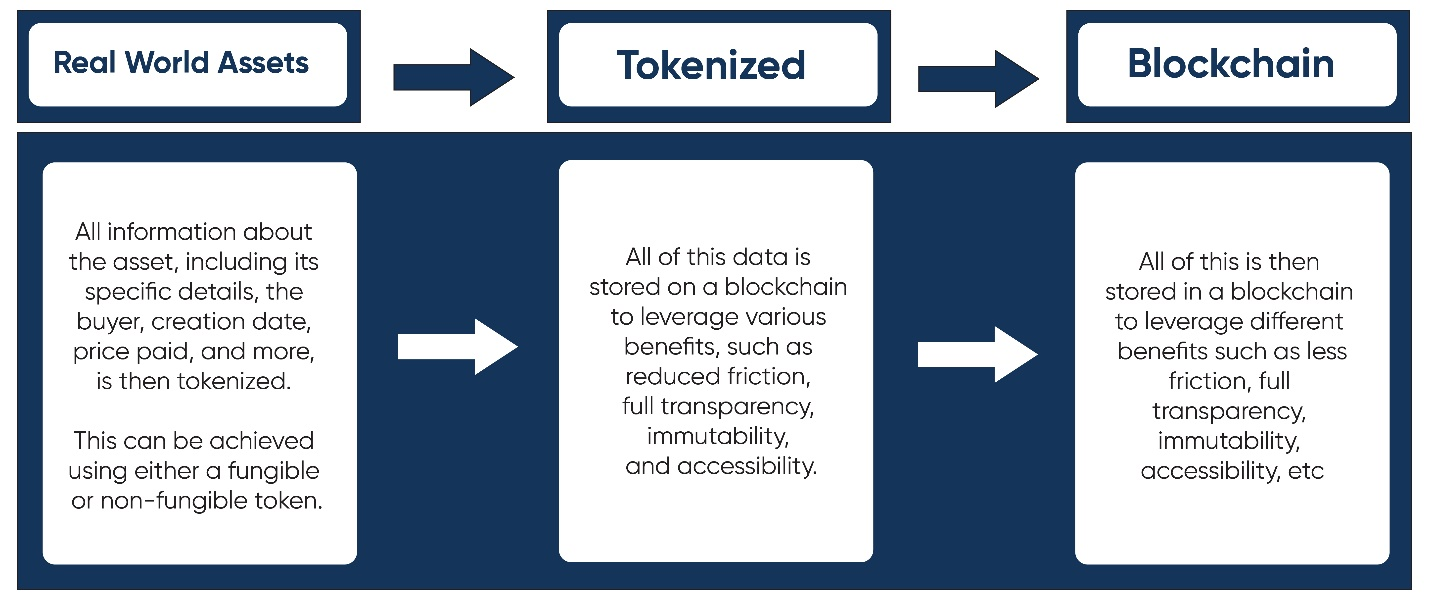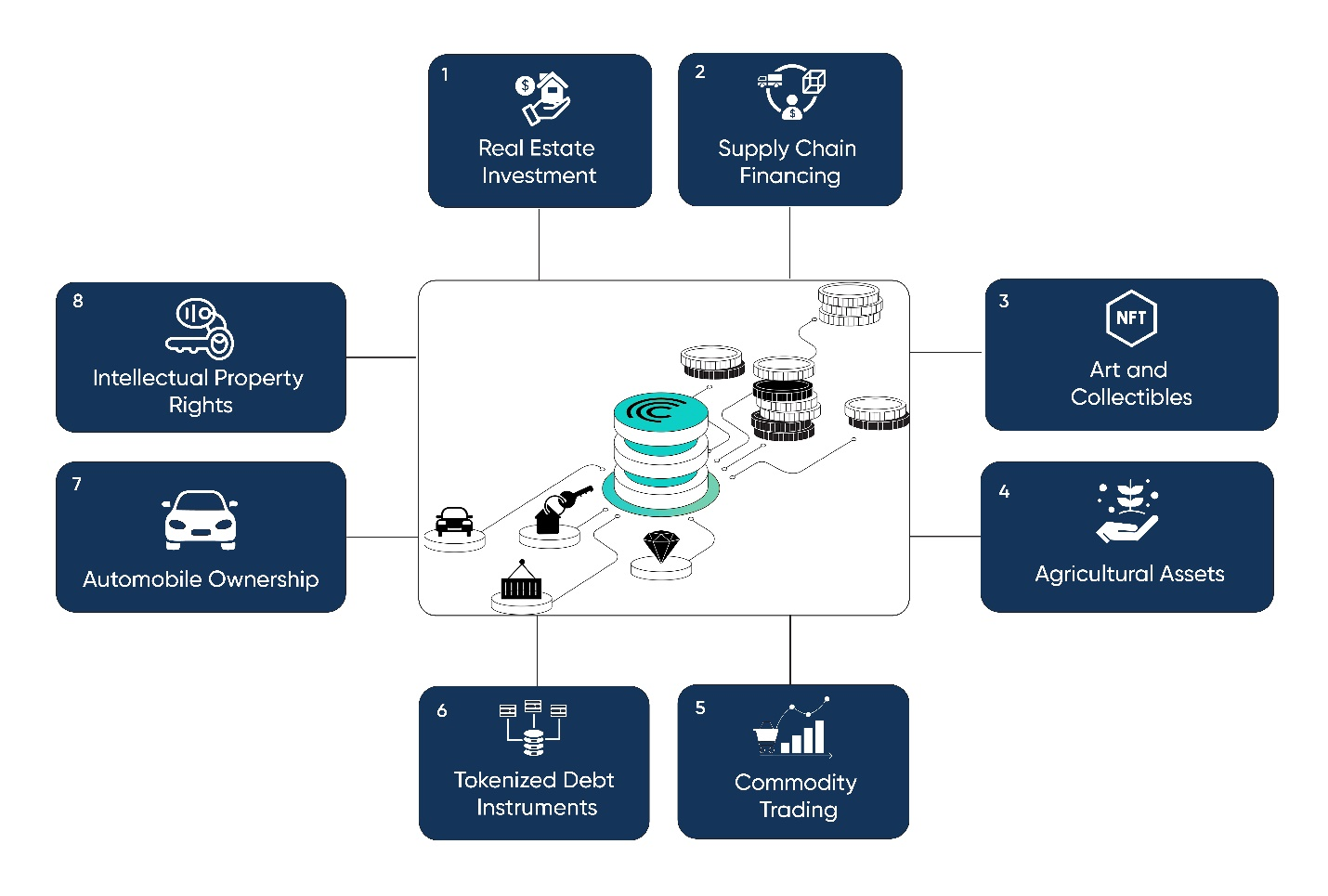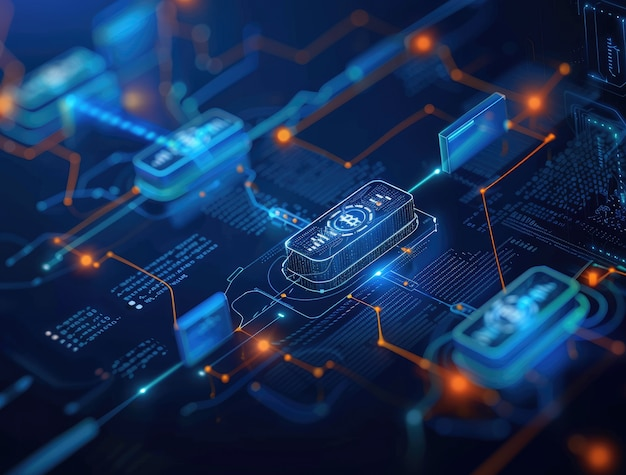
The financial world is evolving rapidly, propelled by advancements in technology and a shift toward decentralization. Central to this transformation is decentralized finance (DeFi), a movement that leverages blockchain technology to provide financial services without the need for traditional intermediaries.
With over $100 billion in assets currently locked in DeFi platforms, this ecosystem is redefining how individuals interact with financial products, fostering an environment of transparency, accessibility, and efficiency.
Concurrently, the concept of real-world assets (RWAs) has emerged as a critical focus for investors and innovators alike. RWAs encompass tangible items like real estate, art, and commodities, as well as intangible assets such as stocks and bonds.
Traditionally, investing in these assets has been cumbersome, characterized by high entry barriers and limited liquidity. However, the rise of tokenization—the process of converting RWAs into digital tokens—offers a groundbreaking solution. By enabling fractional ownership and seamless trading on blockchain networks, tokenization transforms how these assets are perceived and traded.
Keep reading for some expert insights into the essential aspects of DeFi and RWAs, focusing on how tokenization is reshaping the investment landscape and what this means for the future of finance.
Understanding DeFi
DeFi is a transformative movement within the financial sector that leverages blockchain technology to recreate and enhance traditional financial systems. Unlike traditional finance, which relies on centralized institutions like banks and brokers to facilitate transactions, DeFi operates on decentralized networks, primarily on the Ethereum blockchain. This allows individuals to conduct financial transactions directly with one another through smart contracts—self-executing contracts with the terms of the agreement directly written into code.
DeFi encompasses a wide array of financial services, including lending, borrowing, trading, insurance, and savings, all accessible without the need for intermediaries. This innovation offers greater control, transparency, and inclusivity, enabling users to engage with their finances in a more personalized and efficient manner.
However, most DeFi applications have primarily dealt with cryptocurrencies and digital assets. The next step in the evolution of DeFi is the incorporation of RWAs, which could bridge the gap between traditional finance and blockchain-based innovation.
What Are Real-World Assets?
Real-world assets (RWAs) refer to tangible and intangible assets that hold intrinsic value in the physical world. This category includes a diverse range of assets, such as real estate, commodities (like gold and oil), stocks, bonds, and even intellectual property. Historically, RWAs have been cornerstones of wealth generation and investment, offering stability and long-term appreciation.
In recent years, RWAs have gained renewed attention as investors seek to diversify portfolios and explore alternative investment opportunities. By incorporating RWAs, investors can hedge against inflation, mitigate risk, and enhance overall portfolio performance.
Challenges in Traditional Asset Management
Despite their significance, investing in RWAs presents several challenges:
Illiquidity: Many RWAs, such as real estate, are illiquid, making it difficult for investors to quickly convert these assets into cash. This lack of liquidity can hinder investment flexibility and lead to missed opportunities.
High Barriers to Entry: Traditional investments often require significant capital upfront, limiting access for retail investors. For instance, purchasing real estate typically demands a substantial down payment and ongoing maintenance costs.
Complex Ownership Structures: Ownership of RWAs often involves complex legal frameworks, title deeds, and intermediary involvement, making the investment process cumbersome and less transparent.
Limited Access to Diverse Asset Classes: Many retail investors may find it challenging to access specific asset classes, such as fine art or commercial real estate, due to high costs and a lack of investment platforms.

The Role of Tokenization
Tokenization offers a promising solution to the challenges associated with RWAs. The global tokenization market is projected to grow significantly, with a recent report from MarketsandMarkets estimating it will reach $5.6 trillion by 2026, at a compound annual growth rate (CAGR) of 32.4%. This growth is driven by the increasing demand for liquidity, improved access to investment opportunities, and the desire for innovative financial solutions.
The process involves converting physical assets into digital tokens that exist on a blockchain. Each token represents a specific share of the asset, allowing for fractional ownership and easier trading. For example, a real estate property can be tokenized into thousands of digital tokens, enabling multiple investors to purchase a fraction of the property.
Why the Intersection of DeFi and RWAs Matters
The integration of RWAs with DeFi holds transformative potential. As DeFi aims to disrupt traditional finance by eliminating intermediaries, combining RWAs with DeFi applications could bring even greater benefits. Let’s explore some key reasons why this intersection is important.
Increased Liquidity for Illiquid Assets
Many real-world assets, such as real estate or fine art, are considered illiquid. The process of buying or selling these assets is often cumbersome, time-consuming, and expensive. Tokenizing these assets on a blockchain allows for fractional ownership, reducing entry barriers for smaller investors and making these assets more liquid. This newfound liquidity could revolutionize markets that have traditionally been limited to high-net-worth individuals and institutions.
By integrating RWAs into DeFi protocols, investors can not only trade fractionalized assets but also use them as collateral for loans, participate in liquidity pools, or earn yield through staking. This drastically improves the functionality and utility of real-world investments.
Transparency and Trust through Blockchain
Transactions are recorded on a public ledger, ensuring that all parties can verify ownership and transfer history. In traditional finance, RWAs are often hampered by opaque processes, complex ownership structures, and lengthy verification procedures. Blockchain simplifies and automates these processes, providing a clear and immutable record of asset ownership and transfers.
Smart contracts further increase trust by removing the need for intermediaries. When integrated with RWAs, smart contracts can automate payment distribution, enforce legal agreements, and ensure compliance with regulatory requirements. For instance, tokenized real estate contracts could automatically distribute rental income to token holders in real-time, without the need for property managers or third-party administrators.

Enhanced Accessibility and Inclusion
Tokenization democratizes access to investment opportunities, allowing individuals who may not have the capital to invest in entire assets to participate in the market.
By breaking down assets into smaller, tradable tokens, DeFi platforms can attract a wider audience of retail investors. This shift is particularly important as it promotes financial inclusion, providing access to investment opportunities that were previously limited to high-net-worth individuals and institutional investors.
For instance, real estate and fine art have historically been limited to wealthy investors due to the high costs of entry. However, tokenization allows individuals to invest in these assets at a fraction of the price, opening up investment opportunities to a global audience.
Moreover, DeFi platforms can offer investors exposure to RWAs from anywhere in the world, without the need for traditional brokers or intermediaries. This global access can lead to the creation of more efficient and inclusive markets, where individuals from different socioeconomic backgrounds can participate in wealth-building opportunities previously reserved for institutional players.
| According to a report by the World Economic Forum, 1.7 billion adults worldwide remain unbanked, lacking access to financial services. By leveraging DeFi and tokenization, we can create a more inclusive financial ecosystem that empowers individuals from all socioeconomic backgrounds to invest in RWAs.
|
Reduced Costs and Increased Efficiency
Traditional asset transactions often involve multiple intermediaries that drive up costs and slow down the transaction process. DeFi and blockchain technology offer a streamlined alternative by automating many of these functions with smart contracts. This reduces both the time and cost associated with transferring ownership, managing assets, and enforcing contracts.
For instance, in the real estate market, blockchain-based tokenization could eliminate the need for costly title searches, mortgage brokers, and other intermediaries, making the transaction process faster and cheaper. The efficiency could translate to lower fees for investors and greater liquidity for asset holders.
Fractional Ownership and Diversification
Tokenization enables fractional ownership of assets, allowing investors to purchase a portion of high-value assets that would otherwise be inaccessible. This feature is particularly attractive in the real estate market, where properties can be tokenized, allowing multiple investors to collectively own a share of a property.
Programmable Assets
Tokenization enables the creation of programmable assets, where financial features can be embedded directly into the tokens. For instance, tokens can be programmed to automatically distribute rental income to token holders, streamlining cash flow management.
Regulatory Compliance and Innovation
One of the challenges facing DeFi is regulatory uncertainty. The integration of RWAs into DeFi may help address some of these concerns. Security tokens, which represent tokenized RWAs, are subject to existing securities laws, and as such, they provide a framework for regulatory compliance. This could allow for the creation of DeFi platforms that are more aligned with regulatory requirements, while still preserving the core tenets of decentralization and accessibility.
Moreover, DeFi projects that tokenize RWAs may partner with traditional financial institutions to create hybrid models that combine the best elements of both centralized and decentralized finance. These collaborations could lead to the development of new financial products and services that bridge the gap between traditional and decentralized markets.
Find More Insights: How Real-World Asset Tokenization Works: A Step-by-Step Guide

Common Uses of DeFi and Real-World Assets
The integration of DeFi with RWAs is not just a theoretical proposition—it’s already taking shape across several sectors, ranging from real estate to commodities. These emerging use cases highlight the transformative potential of tokenization in sectors that have long been resistant to technological disruption.
1. Real Estate Tokenization
Real estate is one of the largest and most illiquid asset classes globally. Traditional real estate investments require large capital expenditures, making it difficult for small investors to participate.
Tokenizing real estate opens new doors for fractional ownership and provides liquidity to an otherwise illiquid market. Investors can now buy and sell fractions of property in real-time, increasing accessibility and democratizing ownership.
RealT, a blockchain-based platform, allows users to purchase fractional ownership in tokenized rental properties. Investors can buy tokens representing a portion of a property and receive a share of the rental income based on their holdings. This is just one example of how DeFi and RWAs are revolutionizing real estate investment.
2. Commodities Trading
Commodities like gold, oil, and agricultural products are traditionally traded through centralized exchanges, where ownership transfers can be slow, costly, and complex. Tokenization of commodities allows for faster, more secure transactions and lower costs. By using DeFi platforms, investors can trade tokenized versions of these commodities with greater ease and transparency.
For example, Paxos Gold (PAXG) is a token that represents ownership of physical gold stored in vaults. Each token is backed by one ounce of gold, allowing investors to trade gold as a digital asset. This integration of RWAs into the DeFi space brings transparency and liquidity to commodities markets that have long been dominated by centralized intermediaries.
3. Corporate Bonds and Equities
Traditional financial markets for corporate bonds and equities often involve multiple intermediaries, long settlement times, and high transaction costs.
Tokenizing these financial instruments on a blockchain allows for faster settlement, increased transparency, and reduced reliance on third-party brokers. It also enables fractional ownership, allowing investors to purchase small portions of bonds or shares rather than needing to buy an entire bond or share outright.
Several projects are already working on tokenizing corporate bonds, including initiatives like the Santander Bond Issuance, which issued a $20 million bond entirely on the Ethereum blockchain. The use of smart contracts ensured that payments were automatically distributed to investors, reducing costs and improving efficiency.

Trends Shaping the Future of DeFi and Real-World Assets (RWAs)
The intersection of decentralized finance (DeFi) and real-world assets (RWAs) represents one of the most exciting frontiers in both blockchain and traditional finance. As this convergence evolves, several trends are beginning to shape the future of how decentralized systems will manage, trade, and engage with physical and financial assets from the real world. These trends promise to redefine the scope of financial inclusion, liquidity, and asset management. Below, we explore the key trends that are poised to drive this transformation.
Regulation as a Catalyst, Not a Barrier
As governments around the world—such as those in the U.S., Europe, and Singapore—adopt clearer regulatory guidelines for digital assets, DeFi projects dealing with RWAs are likely to benefit from increased legitimacy.
New laws around tokenized securities, digital asset exchanges, and compliance standards are expected to drive institutional participation, which, in turn, will encourage the widespread adoption of tokenized real-world assets.
Increased Compliance Tools in DeFi
Expect to see more DeFi platforms incorporating compliance solutions such as Know Your Customer (KYC), Anti-Money Laundering (AML), and real-time asset auditing. These features are critical to bridging the gap between decentralized finance and traditional financial markets, creating an ecosystem where tokenized RWAs can thrive.
Institutional Products and Infrastructure
Financial institutions are expected to develop infrastructure specifically designed to handle tokenized assets. This could involve creating custodial services, integrating DeFi protocols into traditional financial offerings, and offering tokenized financial products such as bonds, commodities, and real estate. Many institutions are also experimenting with blockchain-based clearing and settlement mechanisms, which could speed up financial transactions and reduce costs for large-scale asset management.
Community Governance for Asset Management
DAOs provide a new paradigm for managing real-world assets by allowing decentralized communities to oversee investments, make decisions on the management of properties, or vote on how tokenized real estate, for example, should be developed or sold. This governance structure can lead to more efficient, democratic asset management by removing centralized decision-makers.
DAOs as Lending and Funding Mechanisms
DAOs are also emerging as vehicles for lending against tokenized RWAs. With the ability to issue loans using collateral in the form of real-world assets, DAOs can operate as decentralized credit networks. This offers an alternative to traditional financial institutions and banks, democratizing access to capital.
DIDs for RWA Tokenization
For RWAs, identity verification is crucial. For example, ownership of a property or a security token representing shares in a company must be associated with a legal identity. DIDs provide a seamless way for DeFi platforms to verify the credentials of users, asset owners, and counterparties in a decentralized way while still adhering to necessary regulatory standards.
Cross-Platform Interoperability
DIDs will allow users to interact with multiple DeFi platforms and tokenized asset markets using a single digital identity, streamlining processes such as signing contracts, securing loans, or verifying ownership. As DIDs become more widespread, we can expect them to be integrated into DeFi protocols handling RWAs, creating a more secure and user-friendly ecosystem.

Cross-Chain Bridges for Tokenized Assets
Cross-chain bridges enable tokenized assets to move seamlessly between different blockchains. This trend is critical for RWAs, as the assets may be tokenized on one chain (such as Ethereum) but traded or utilized on another chain (such as Solana or Avalanche). Cross-chain functionality will expand the liquidity and utility of RWAs, making them more versatile and accessible across DeFi markets.
Layer-2 Scaling for Cost-Efficiency
Layer-2 solutions, such as Polygon or Optimism, provide faster and more cost-efficient transaction processing by building on top of layer-1 blockchains like Ethereum. As DeFi platforms integrate RWAs, these solutions will reduce gas fees and transaction costs, making it feasible for smaller investors to participate in DeFi markets that handle tokenized real-world assets.
Risk Management with Smart Contracts
Derivatives based on tokenized RWAs can be further managed through smart contracts, which can automatically enforce conditions like stop-loss limits, margin requirements, or liquidation thresholds. This introduces a more transparent and efficient risk management system compared to traditional derivatives markets.
Tokenized Real-World Asset Marketplaces and Liquidity Pools
We can expect the growth of decentralized marketplaces tailored specifically for trading tokenized RWAs. These platforms will allow investors to seamlessly trade tokenized real estate, art, commodities, or securities, providing much-needed liquidity to traditionally illiquid assets. The creation of robust secondary markets for RWAs will make DeFi platforms even more attractive for investors.
DeFi platforms are likely to develop liquidity pools for RWAs, where investors can provide liquidity in exchange for yield. For example, a liquidity pool might be created for tokenized real estate or bonds, allowing users to stake their tokens in return for passive income. This will bring more liquidity to the RWA space, making it easier to buy, sell, or trade real-world assets on-chain.
Carbon Credits and Green Bonds on Blockchain
DeFi platforms can facilitate the tokenization of carbon credits, green bonds, and other sustainability-focused assets, enabling investors to support environmental initiatives while also minimizing risks in financial returns. Tokenizing these assets makes them more accessible and tradable, bringing liquidity to a traditionally niche market.
Impact Investing through DeFi
Tokenized RWAs aligned with sustainability goals can attract impact investors looking to support environmental, social, and governance (ESG) initiatives. DeFi platforms can offer new financial products that allow users to invest in tokenized projects aimed at reducing carbon emissions, promoting renewable energy, or conserving natural resources.
Discover Investment Opportunities
Interested in diversifying your portfolio with tokenized real-world assets? Get in touch with Kenson Investments to discover unique investment opportunities and strategies designed for the modern investor! Have questions about integrating real-world assets into your investment strategy? Reach out to our Blockchain and digital asset consulting specialists to explore how we can assist you in this evolving market.
Discover the benefits of digital asset management consulting and explore Digital asset investment solutions tailored to your needs. Our team provides guidance on bitcoin investment consultants and Cryptocurrency investment consultant services, as well as insights into Altcoin investment options. For comprehensive support, consider our Digital assets consulting offerings, including Digital asset portfolio management.
Disclaimer: The information provided on this page is for educational and informational purposes only and should not be construed as financial advice. Cryptocurrency assets involve inherent risks, and past performance is not indicative of future results. Always conduct thorough research and consult with a qualified financial advisor before making investment decisions.
“The cryptocurrency and digital asset space is an emerging asset class that has not yet been regulated by the SEC and US Federal Government. None of the information provided by Kenson LLC should be considered financial investment advice. Please consult your Registered Financial Advisor for guidance. Kenson LLC does not offer any products regulated by the SEC including, equities, registered securities, ETFs, stocks, bonds, or equivalents”














